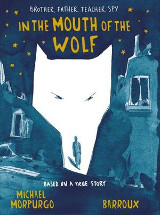In the mouth of the wolf by Michael Morpurgo

Ill. by Barroux. Egmont, 2018. ISBN 9781405285261
(Age: Independent readers) Recommended. In the village of Le Pouget, in the
Languedoc region of south west France, Francis Cammaerts is resting
after the celebrations for his 90th birthday come to a close. As
dusk turns to dark and the church bell strikes midnight, he thinks
of those who have been a part of his journey to this ripe old age -
those who raised him, supported him and had so much to do with the
man he became. And from those reminiscences comes a story of
determination, danger, courage and heroism that would have gone
untold if not for Morpurgo's pen and Barroux's brush.
One of two sons born during the Great War, Francis grows up to be a
teacher while his brother Pieter is a burgeoning actor. But when
World War II breaks out, the brothers take very different paths.
Frances believes war is futile and barbaric, that people should not
descend to the level of the fascists and that only education and
pacifism are the "way forward for humanity". Pieter, however,
believes that pacifism will not stop Hitler, that the cruelty of
fascism had to be confronted and so he became a Sergeant Navigator
in the RAF. While he eventually went to join a bomber squadron in
Cornwall, Francis went to Lincolnshire to work on a farm having
justified his beliefs to a tribunal.
But when Pieter is killed returning from an air raid over France and
a bomb dropped by a German plane kills the family on the next farm
including including baby Bessie, Francis begins to rethink his
decision, particularly as he now has a wife and the birth of his own
child is imminent. He talks to Harry, his mentor from his teaching
days - a conversation that changes his life forever as it leads him
into the silent world of the secret agent working with the
Resistance in France . . .
As with Flamingo Boy, Morpurgo shines a light on the real
story of war and its impact on ordinary people by taking an unusual
perspective and telling the story through that. This is not a tale
of derring-do embellished with action scenes and special effects -
although it could be that in the hands of another - but a quiet tale
of remembrance and reflection, of the impact of the legacy of others
on a particular life, when that life itself has left its own legacy.
Morpurgo has said, "This book may read like fiction. But it is not.
That is because it does not need to be." It is the story of his own
uncles.
Generously illustrated using family photographs which are included
at the back of the book as well as biographical details of those who
had such a profound impact within the story, Morpurgo has produced a
work that not only tells yet another untold story of the war but one
which has shaped his life too.
One for independent readers wanting something different, compelling
and utterly readable.
Barbara Braxton